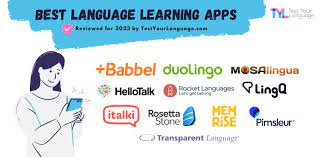The Power of Language Learning Programs
Learning a new language can open doors to exciting opportunities and broaden your horizons. In today’s interconnected world, language skills are more valuable than ever. Language learning programs play a crucial role in helping individuals master a new language efficiently and effectively.
Benefits of Language Learning Programs
Language learning programs offer a structured approach to acquiring a new language. Whether you’re a beginner or looking to enhance your existing language skills, these programs provide a comprehensive curriculum that covers grammar, vocabulary, pronunciation, and cultural nuances.
Here are some key benefits of language learning programs:
- Interactive Learning: Many language programs incorporate interactive exercises, games, and multimedia resources to engage learners and make the learning process enjoyable.
- Flexibility: Online language learning platforms allow users to study at their own pace and convenience, fitting lessons into their busy schedules.
- Personalised Feedback: Some programs offer personalised feedback on pronunciation and grammar mistakes, helping learners improve their language skills effectively.
- Cultural Insights: Language programs often include cultural components that provide insights into the customs, traditions, and history of the target language’s speakers.
Popular Language Learning Programs
There is a wide range of language learning programs available to cater to different preferences and learning styles. Some popular language learning platforms include:
- Duolingo: A user-friendly app that offers gamified lessons in multiple languages.
- Rosetta Stone: Known for its immersive approach to language learning through interactive software and live tutoring sessions.
- Babbel: Focuses on practical vocabulary and conversation skills through interactive exercises.
- Pimsleur: Emphasises audio-based learning with a focus on pronunciation and conversational fluency.
The Future of Language Learning
Innovations in technology continue to revolutionise the field of language learning. Virtual reality simulations, artificial intelligence tutors, and adaptive learning algorithms are shaping the future of how we acquire new languages. These advancements promise more personalised and efficient ways for individuals to become multilingual.
Whether you’re interested in expanding your career opportunities, connecting with people from different cultures, or simply challenging yourself intellectually, exploring a new language through dedicated language learning programs can be a rewarding journey.
Advantages of Language Learning Programmes: Structured, Interactive, and Flexible Approaches with Personalised Feedback and Cultural Insights
- Structured approach to learning
- Interactive and engaging lessons
- Flexibility to study at your own pace
- Personalised feedback on progress
- Cultural insights and understanding
- Access to a wide range of languages
Challenges of Language Learning Programs: Cost, Interaction, Content, Technology, and Motivation
- Costly subscription fees for premium language learning programs may be prohibitive for some learners.
- Limited interaction with native speakers in language learning programs can hinder practical language skills development.
- Some language learning programs may lack specialised content for niche languages or dialects.
- Over-reliance on technology in language learning programs may lead to a disconnect from traditional teaching methods and human interaction.
- Difficulty in maintaining motivation and consistency when using self-paced language learning programs without external accountability.
Structured approach to learning
One significant advantage of language learning programs is their structured approach to learning. By providing a clear roadmap and organised curriculum, these programs guide learners through the intricacies of a new language in a systematic manner. This structured approach ensures that learners cover essential grammar rules, vocabulary building exercises, and language skills development progressively, laying a solid foundation for mastering the target language. Such organised learning paths help learners stay focused, track their progress effectively, and build confidence as they advance towards fluency.
Interactive and engaging lessons
Interactive and engaging lessons are a key advantage of language learning programs as they make the process of acquiring a new language enjoyable and effective. By incorporating interactive exercises, games, and multimedia resources, these programs keep learners motivated and actively involved in their learning journey. This hands-on approach not only enhances retention of vocabulary and grammar rules but also fosters a deeper understanding of the language’s nuances and cultural context. Interactive lessons create an immersive learning experience that simulates real-life conversations, making language acquisition both dynamic and rewarding.
Flexibility to study at your own pace
One significant advantage of language learning programs is the flexibility they offer, allowing individuals to study at their own pace. This feature enables learners to tailor their language learning journey to fit their unique schedules and learning preferences. Whether fitting in quick lessons during a busy day or diving deep into immersive study sessions, the ability to progress at a comfortable speed ensures that learners can effectively absorb and retain new language skills without feeling rushed or overwhelmed.
Personalised feedback on progress
One significant benefit of language learning programs is the provision of personalised feedback on progress. By receiving tailored guidance on areas of improvement, learners can track their development and focus on enhancing specific language skills. This individualised feedback not only boosts motivation but also ensures that learners can address weaknesses effectively, leading to more efficient and targeted language acquisition.
Cultural insights and understanding
Language learning programs offer a valuable pro by providing cultural insights and fostering a deeper understanding of different societies. By delving into the customs, traditions, and history of a language’s native speakers, learners gain a holistic perspective on the cultural nuances that shape communication. This immersive experience not only enhances language proficiency but also promotes empathy, respect, and appreciation for diverse cultures worldwide. Understanding the cultural context behind a language enriches the learning process and enables individuals to connect more authentically with people from different backgrounds.
Access to a wide range of languages
Language learning programs offer the invaluable pro of granting individuals access to a diverse array of languages from around the world. Whether you aspire to master a widely spoken language like Spanish or Mandarin, delve into lesser-known languages such as Swahili or Icelandic, or explore niche dialects and regional variations, these programs provide a gateway to linguistic diversity. By offering a platform to study an extensive range of languages, learners can broaden their cultural understanding, enhance their communication skills, and forge connections with people across different continents and communities. The opportunity to explore such a wide range of languages not only enriches one’s personal growth but also fosters a deeper appreciation for the global tapestry of human expression.
Costly subscription fees for premium language learning programs may be prohibitive for some learners.
For some learners, the high cost of subscription fees for premium language learning programs can present a significant barrier. The expense involved in accessing top-tier language learning platforms may be prohibitive for individuals with limited financial resources or those seeking more affordable alternatives. This financial constraint could potentially hinder access to advanced features, personalised tutoring, and exclusive content that these premium programs offer, limiting the educational opportunities available to a broader range of language enthusiasts.
Limited interaction with native speakers in language learning programs can hinder practical language skills development.
Limited interaction with native speakers in language learning programs can hinder practical language skills development. While language learning programs offer valuable resources and structured lessons, the absence of real-time conversations with native speakers can limit learners’ ability to practice authentic dialogue, pronunciation, and cultural nuances. Interacting with native speakers provides invaluable opportunities to improve listening comprehension, fluency, and confidence in using the language in real-world scenarios. Without this crucial element, learners may find it challenging to fully grasp the subtleties of a language and develop the necessary communication skills for effective interpersonal exchanges.
Some language learning programs may lack specialised content for niche languages or dialects.
Some language learning programs may fall short in providing specialised content for niche languages or dialects, limiting the options available for learners seeking to explore less commonly taught languages. As a result, individuals interested in mastering specific dialects or regional languages may struggle to find comprehensive resources tailored to their linguistic goals within mainstream language learning platforms. This gap in specialised content can pose a challenge for those looking to delve deeper into lesser-known languages and dialects, requiring them to seek alternative sources or personalised instruction to achieve proficiency in these linguistic nuances.
Over-reliance on technology in language learning programs may lead to a disconnect from traditional teaching methods and human interaction.
Over-reliance on technology in language learning programs can potentially result in a disconnect from traditional teaching methods and human interaction. While technology offers innovative tools and resources for language learners, it may diminish the importance of face-to-face communication and personal feedback from instructors. The absence of real-time interactions with teachers and peers could hinder the development of essential language skills such as pronunciation, intonation, and cultural nuances that are best learned through direct human engagement. Striking a balance between leveraging technology for efficiency and preserving the value of interpersonal communication is crucial to ensure a well-rounded language learning experience.
Difficulty in maintaining motivation and consistency when using self-paced language learning programs without external accountability.
One significant drawback of self-paced language learning programs is the challenge of maintaining motivation and consistency without external accountability. When learners have the freedom to progress at their own pace, it can be easy to procrastinate or lose interest over time. Without the structure of regular classes or a teacher monitoring progress, individuals may struggle to stay motivated and dedicated to their language learning goals. The lack of external accountability in self-paced programs can lead to inconsistent study habits and hinder overall language proficiency development.



